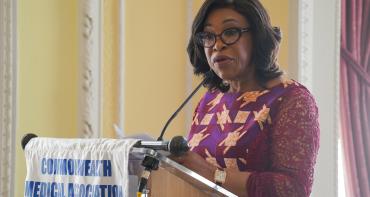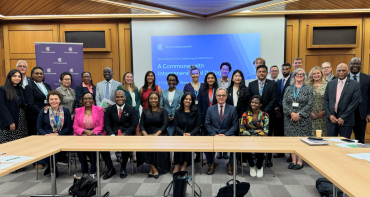The World Malaria Report 2024 findings highlight notable advancements within Commonwealth countries to combat the incidence of malaria cases. Belize was certified malaria-free for the second year running and across Africa - in Cameroon, Gambia, Ghana, Kenya, Mozambique, Sierra Leone, Togo, Tanzania – the incidence rate has been reduced.

Additionally, India exited the 11 for demonstrating significant progress in reducing the malaria incidence and mortality observed in its high-endemic states.
The world’s deadliest disease kills one child every minute. New data in this shows a spike in global malaria cases. While malaria programmes are effectively saving lives in about 83 countries around the world, the staggering reality is that, globally, almost 1 in 10 children die from malaria each year.
and the , brought stakeholders together on 16 December 2024 at the Houses of Parliament to reflect on the report’s findings and make the case that investing in ending malaria is the economically smart thing to do.

The CEO of Malaria No More UK, Dr Astrid Bonfield, spoke about the complex challenges that impede progress. She said:
"Malaria is a disease that affects a diverse range of people but takes a disproportionate toll on the poorest, least educated, and most disenfranchised people in the world. That includes women and girls, the poor, and those living in the most remote areas. This year’s report shines a light on malaria’s relationship to inequality.
“It also underscores how gender and socioeconomic factors intersect, with women and girls disproportionately affected due to barriers in accessing prevention tools, diagnosis, and treatment.”

Commenting on the Commonwealth’s efforts to meet global zero malaria targets, the Head of Social Policy Development at the ĚÇĐÄĚ˝»¨, Layne Robinson said:
“The World Malaria Report 2024 underscores the progress and ongoing challenges for ending malaria. The findings will contribute to our annual and the , to support our commitment to ending malaria. This commitment was reaffirmed at the Commonwealth Heads of Government Meeting in Samoa this year.
“While we are making progress towards malaria reduction, we look forward to our upcoming Commonwealth Malaria Report, to be published in the first half of 2025, and supporting countries in advocating for comprehensive malaria elimination strategies, which will be crucial for achieving a malaria-free world by 2030”.
Progress, milestones and commitments
Parliamentarians were informed of the work of UK-funded organisations, such as Zero Malaria and Gavi, the Vaccine Alliance, which deliver malaria-fighting tools worldwide.
Discussions also focused on the danger of inertia. Krystal Birungi, a survivor and Entomologist at the Uganda Virus Research Institute who recounted her ordeal said:
“As a scientist, I am now working towards finding genetic solutions to fight malaria and to raise awareness on the need to invest in malaria prevention, treatment, and the development of new tools.”
Malaria continues to cause hundreds of thousands of deaths, particularly on the African continent, which accounts for 95% of global deaths. With 21 of its member countries within this region, the Commonwealth continues to take steps to stem this trend. Notable milestones achieved throughout 2024 include:
- January: Cameroon was the first country to introduce the recommended for malaria-endemic areas.
- March: Malaria updates were presented to Commonwealth senior officials and High Commissioners during the bi-annual Commonwealth Advisory Committee on Health meeting.
- May: The 2024 Commonwealth Malaria Report was launched at the 36th Commonwealth Health Ministers Meeting in Geneva, detailing progress and challenges.
- October: Leaders at the reaffirmed their commitment to end malaria by 2030 and celebrated the progress achieved among members through partnerships, innovation, and strengthened regional cooperation.
Commonwealth Heads of Government also agreed to collectively support the replenishment of the Global Fund in 2025 to achieve 2030 health-related SDGs.
Read the
Media contact
-
Ijeoma Onyeator Communications Officer, Communications Division, ĚÇĐÄĚ˝»¨


